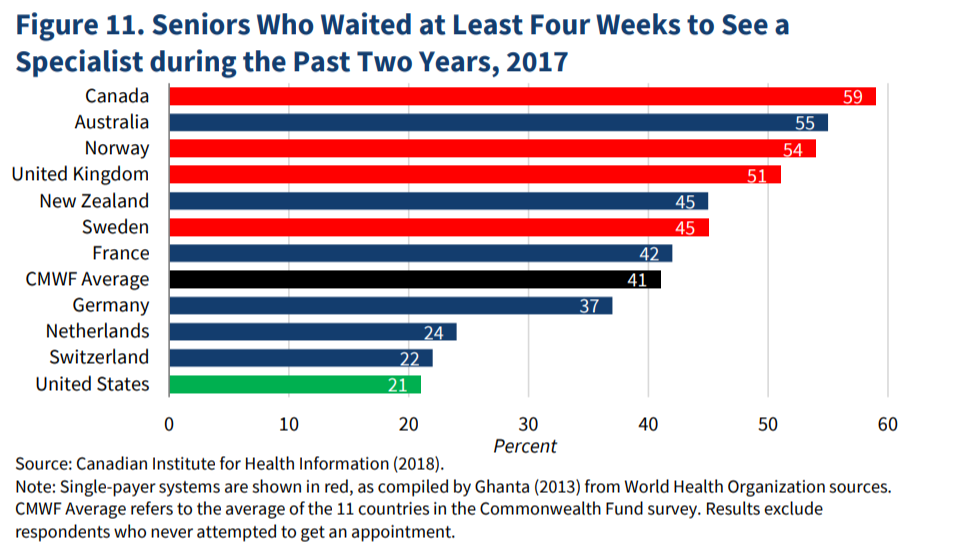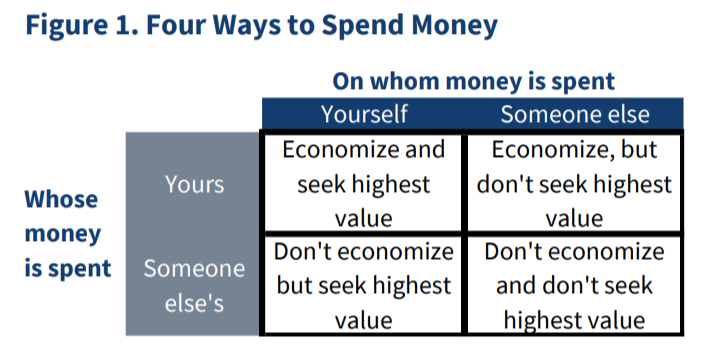The White House's laughably bad attack on Medicare-for-all
Is this the best they can do?

A free daily email with the biggest news stories of the day – and the best features from TheWeek.com
You are now subscribed
Your newsletter sign-up was successful
Your faithful correspondent made an appearance in a White House Council of Economic Advisers (CEA) report on Tuesday. If it weren't the Trump administration, I would have been gobsmacked at this development, as well as the incredible amateurishness of the product. But because it is the Trump administration, I'm mildly impressed that they spelled my name correctly.
The report is titled "The Opportunity Costs of Socialism," and it reads like it was written by the guy who wrote the Dow: 36,000 book published right before the dot-com stock market crash — oh wait, turns out the co-author is now chair of the CEA. What fun times we live in.
In between agitprop about Venezuela and some truly ridiculous economics, the report spends a lot of time trying to prove Medicare-for-all is bad, which is where it cites one of my previous articles. (Perhaps they were inspired by new polling that shows a majority of Republicans now support the policy.) Unsurprisingly, the case is total garbage.
The Week
Escape your echo chamber. Get the facts behind the news, plus analysis from multiple perspectives.

Sign up for The Week's Free Newsletters
From our morning news briefing to a weekly Good News Newsletter, get the best of The Week delivered directly to your inbox.
From our morning news briefing to a weekly Good News Newsletter, get the best of The Week delivered directly to your inbox.
One prong of the argument is the typical conservative circular reasoning about markets. Medicare-for-all will remove choices, and thereby reduce freedom: "A consumer who is unhappy with the state’s choices has little recourse," the authors write. The logic here is that because markets (supposedly) operate through consumers choosing between different providers, they increase freedom, which can be seen because customers get to choose. But this is just to say markets increase freedom because they increase freedom.
Fallacies aside, the assumption here is that choice is what we want. But is it? If health care is delivered through market institutions, I am forced to make complicated, burdensome decisions I am unqualified to make about insurance options and other matters. Should I pick a higher deductible and hope I don't get sick, or a lower one and chance paying a lot for coverage I don't use? Then I must pay very close attention to doctor networks, covered prescription drugs, and so on.
Then if I ever have to actually get treated, I have to become an amateur claims adjuster and medical regulation policy specialist, because of the strong possibility either the insurance company or the provider (or both) will try to rip me off to the tune of tens or hundreds of thousands of dollars. And if I just have a random emergency and end up in an out-of-network hospital, chances are my life savings are going into some health-care executive's third Maserati.
Speaking personally, I hate doing this stuff. I would gladly pay considerably more in taxes to get simple, universal coverage that I knew was always there when I needed it — indeed, it would be cause for delirious celebration, because I would be free of all that headache and worry. I (or anyone else) could go back to school, or start a new business, or take to the road as an itinerant nature writer, secure in the knowledge that if I got sick, I would still be able to receive care. A universal system would thus be tremendously freedom-enhancing.
A free daily email with the biggest news stories of the day – and the best features from TheWeek.com
A second prong in the CEA report has to do with wait times, and it straightforwardly makes the case for Medicare-for-all while pretending otherwise. I am not exaggerating even slightly. Here is the chart.

(CEA)
The takeaway here is supposed to be that America's free-market system keeps wait times low for seniors. The problem is that almost all Americans over 65 are on Medicare, the very single-payer system the report is supposedly disproving. Sarah Kliff digs into more minor distortions here, but this is about as nakedly a case of up-is-down lying one could possibly imagine.
Another major prong is about money. They include the following high school-level illustration of economic incentives:

(CEA)
The idea is that "[i]ndividuals also have little reason to economize on anything that they can obtain without payment," implying that medical spending will shoot through the roof under Medicare-for-all. The very obvious problem with this hypothesis is that America already has a fairly private market-based health-care system, and we have the most expensive health care in the world by a huge margin.
As I carefully explained in the article cited by the CEA, America's ramshackle health-care system is simply wasting that money. We don't get to see the doctor more, and our health-care outcomes range from mediocre to abysmal. Every year we flush a trillion bucks straight down a toilet of price-gouging, pointless complexity, and straight-up fraud.
There is some more stuff about Medicare-for-all torpedoing the American economy to the tune of eleventy bazillion dollars, but the various theoretical rationales are so preposterous they aren't worth getting into. If this is the best attack on Medicare-for-all American conservatives can come up with, we may safely conclude the policy debate is settled.
Ryan Cooper is a national correspondent at TheWeek.com. His work has appeared in the Washington Monthly, The New Republic, and the Washington Post.
-
 How Democrats are turning DOJ lemons into partisan lemonade
How Democrats are turning DOJ lemons into partisan lemonadeTODAY’S BIG QUESTION As the Trump administration continues to try — and fail — at indicting its political enemies, Democratic lawmakers have begun seizing the moment for themselves
-
 ICE’s new targets post-Minnesota retreat
ICE’s new targets post-Minnesota retreatIn the Spotlight Several cities are reportedly on ICE’s list for immigration crackdowns
-
 ‘Those rights don’t exist to protect criminals’
‘Those rights don’t exist to protect criminals’Instant Opinion Opinion, comment and editorials of the day
-
 The billionaires’ wealth tax: a catastrophe for California?
The billionaires’ wealth tax: a catastrophe for California?Talking Point Peter Thiel and Larry Page preparing to change state residency
-
 Bari Weiss’ ‘60 Minutes’ scandal is about more than one report
Bari Weiss’ ‘60 Minutes’ scandal is about more than one reportIN THE SPOTLIGHT By blocking an approved segment on a controversial prison holding US deportees in El Salvador, the editor-in-chief of CBS News has become the main story
-
 Has Zohran Mamdani shown the Democrats how to win again?
Has Zohran Mamdani shown the Democrats how to win again?Today’s Big Question New York City mayoral election touted as victory for left-wing populists but moderate centrist wins elsewhere present more complex path for Democratic Party
-
 Millions turn out for anti-Trump ‘No Kings’ rallies
Millions turn out for anti-Trump ‘No Kings’ ralliesSpeed Read An estimated 7 million people participated, 2 million more than at the first ‘No Kings’ protest in June
-
 Ghislaine Maxwell: angling for a Trump pardon
Ghislaine Maxwell: angling for a Trump pardonTalking Point Convicted sex trafficker's testimony could shed new light on president's links to Jeffrey Epstein
-
 The last words and final moments of 40 presidents
The last words and final moments of 40 presidentsThe Explainer Some are eloquent quotes worthy of the holders of the highest office in the nation, and others... aren't
-
 The JFK files: the truth at last?
The JFK files: the truth at last?In The Spotlight More than 64,000 previously classified documents relating the 1963 assassination of John F. Kennedy have been released by the Trump administration
-
 'Seriously, not literally': how should the world take Donald Trump?
'Seriously, not literally': how should the world take Donald Trump?Today's big question White House rhetoric and reality look likely to become increasingly blurred
